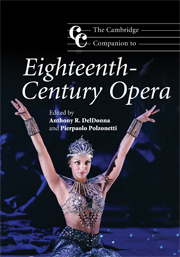Book contents
- Frontmatter
- Part I The making of opera
- Part II National styles and genres
- 9 Genre and form in French opera
- 10 Genre and form in German opera
- 11 Opera in eighteenth-century England: English opera, masques, ballad operas
- 12 Opera in Naples
- 13 Portugal and Brazil
- 14 Opera, genre, and context in Spain and its American colonies
- Notes
- Bibliography
- Index
11 - Opera in eighteenth-century England: English opera, masques, ballad operas
from Part II - National styles and genres
Published online by Cambridge University Press: 28 September 2011
- Frontmatter
- Part I The making of opera
- Part II National styles and genres
- 9 Genre and form in French opera
- 10 Genre and form in German opera
- 11 Opera in eighteenth-century England: English opera, masques, ballad operas
- 12 Opera in Naples
- 13 Portugal and Brazil
- 14 Opera, genre, and context in Spain and its American colonies
- Notes
- Bibliography
- Index
Summary
The central truth of English opera in the eighteenth century – as opposed to opera in England during the same period – is that the genre is not recognizable to those contemporary scholars and aficionados who believe that only all-sung dramatic works can be thus described. “Operas” in London could be long or short, high or low, have as few or as many characters as the playwright or librettist chose, could contain (or not, as fashion dictated) dancing, transformations, and pageants. However, unless an audience was told otherwise – by a particular work being described as “an English opera after the Italian manner,” for example – they would expect spoken dialogue between numbers, not sung recitative, an expectation which would continue well into the nineteenth century. This situation is distressing to those scholars who believe that all operas should aspire to the condition of Figaro or Tristan. It is a delight, however, to others, in particular to those who revel in the flexible nature of the genres that were present on the eighteenth-century London stage, and who do not object to dirtying their hands with this mass of related, often ephemeral, forms which such a scene produced. The dirtying of hands is of course the result of handling the genres; by definition, they are messy round the edges, with their origins not above suspicion, and their substance most frequently established as the result of the commercial concerns of the management.
- Type
- Chapter
- Information
- The Cambridge Companion to Eighteenth-Century Opera , pp. 202 - 213Publisher: Cambridge University PressPrint publication year: 2009



